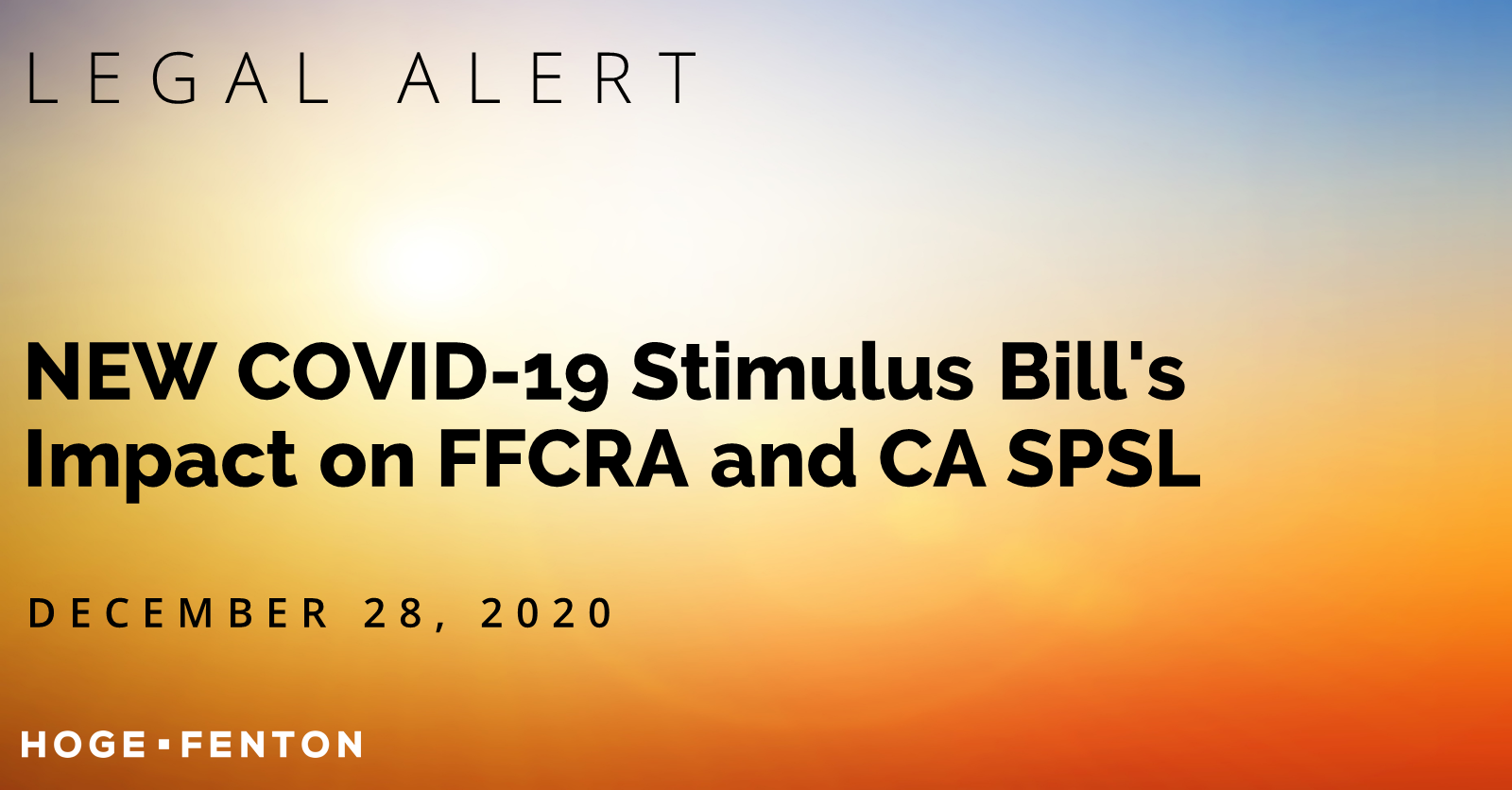New COVID-19 Stimulus Bill’s Impact on FFCRA & CA SPSL
By Hoge Fenton | 12.28.2020 | Employment Law

by Maysa Saeed and Jenn Protas, Employment Law Group
On April 1, 2020, the United States Department of Labor (“Department”) announced the Emergency Paid Sick Leave Act and Emergency Family and Medical Leave Expansion Act, both part of the Families First Coronavirus Response Act (“FFCRA”). The FFCRA requires employers with 500 or fewer employees to provide their eligible employees with paid sick leave and expanded family and medical leave for specified reasons related to COVID-19. These paid leave provisions became operational on April 1, 2020 and are set to expire on December 31, 2020.
The FFCRA helps mitigate the effects of COVID-19 in the workplace by reimbursing covered employers with tax credits for the cost of providing employees with paid leave taken for specified reasons related to COVID-19. Covered employers qualify for dollar-for-dollar reimbursement through tax credits for all qualifying wages paid under the FFCRA, up to the appropriate per diem and aggregate payment caps. Applicable tax credits also extend to amounts paid or incurred to maintain health insurance coverage. As such, the FFCRA enables employers to keep their workers on their payroll, while at the same time ensuring that workers are not forced to choose between their paychecks and the public health measures needed to combat the virus.
What Happens to Paid Leave Under the FFCRA After December 31, 2020?
Until this week, it was uncertain whether Congress would extend the FFCRA into next year. Congressional leaders, however, have agreed on a $900 billion coronavirus relief bill (the “Bill”) that provides an answer to the fate of the paid leave provisions under the FFRCA. The current version of the legislation (signed by the President December 27, 2020) results in the following:
- Required paid leave under FFCRA ends on December 31, 2020.
- As of January 1, 2021, covered employers may voluntarily provide emergency paid sick leave or emergency paid leave under FFCRA to continue receiving the tax credit benefits associated with this leave. The tax credit may only be taken for leave through March 31, 2021.
Therefore, effective January 1, 2021, paid leave under the FFCRA will no longer be required. Covered employers who voluntarily provide paid leave benefits under the FFCRA through March 31, 2021, will remain eligible to receive tax credits for the paid leave. It should be noted, the Bill does not seem to provide a new set of tax credits or leave. In other words, if an employee has already taken 80 hours of emergency paid sick leave in 2020, then the employee would not be entitled to new emergency paid leave in 2021. With respect to the expanded family and medical leave provisions, presumably, if the employer’s 12-month period for FMLA resets under the employer’s policy, the employee would be entitled to paid FMLA again. It is not clear whether that was the Department’s intent or whether future guidance will provide otherwise.
How Does the Bill Impact California’s Supplemental Paid Sick Leave?
Although larger employers, with 500 or more employees, are not governed by the FFCRA, California enacted supplemental paid sick leave (“SPSL”) to account for time off due to COVID-19-related reasons. In California, covered employers are required to provide SPSL to their eligible employees through: (i) December 31, 2020, or (ii) an extension of the FFCRA. It is currently unclear whether the paid leave provisions under the Bill, given its voluntary nature, would constitute as an “extension.” Therefore, until California provides further guidance, it remains unclear whether covered employers will be required to provide SPSL to their eligible employees through March 31, 2021.
Key Takeaways:
- Under the FFCRA, covered employers are only required to provide emergency paid sick leave or emergency paid Family and Medical Leave Act until December 31, 2020.
- Effective January 1, 2021, covered employers under FFCRA may voluntarily provide emergency paid sick leave or emergency paid Family and Medical Leave Act to take the tax credit associated with this leave through March 31, 2021.
- While covered employers under the FFCRA are no longer required to provide paid leave under federal law as of January 1, 2021, they should remain mindful of other paid leave requirements under state and local laws.
- In California, while employers with more than 500 employees are required to provide SPSL through at least December 31, 2020, it is possible it will be extended. So stay tuned!
For more information or resources regarding the FFCRA, California’s SPSL, or other COVID-related laws applicable to employers and/or employees, please refer to Hoge Fenton’s Employment Law Group’s resource page (here), or feel free to contact a member of the Employment Law Group.
 |
Maysa Saeed is an associate attorney whose practice focuses on employment counseling and litigation and assists clients in all aspects of employment law. Prior to joining Hoge Fenton, Maysa was a litigation associate with experience litigating various commercial, employment, and real estate matters. Maysa’s prior legal experience also includes defending insurance carriers in administrative trials before the Workers’ Compensation Appeals Boards in San Jose and Salinas. |
 |
Jenn Protas helps employers navigate California’s numerous employment laws and defends employers with an eye toward successful, yet cost-effective resolution. Jenn is a committed advocate for her clients and a tenacious litigator. She defends employers on matters related to wage and hour law, wrongful termination, harassment, discrimination, and retaliation in single-plaintiff litigation, Private Attorney General Act actions, and/or class actions. Jenn’s practice also includes housing discrimination matters and business litigation. |
 |
Sarju Naran is a zealous advocate for his clients and approaches litigation with creativity and strategy. Chair of Hoge Fenton’s Employment Law Group, Sarju’s experience spans from representing middle-market and family-owned closely held businesses to large multi-national companies. He regularly litigates and provides advice and counsel to companies on wage and hour issues, trade secret misappropriation, employee mobility, wrongful termination, performance management, and leaves of absence. |
 |
Embert P. Madison, Jr. is a transactional associate and his practice focuses on real estate, employment advice and counsel, and cannabis regulation. He has represented clients in commercial real estate transactions throughout California, Texas, and Florida. Embert has extensive cannabis regulatory experience representing both local governments and private businesses. He has drafted cannabis business and zoning regulations for nine cities in Northern and Central California. |
This information is provided as an educational service by Hoge Fenton for clients and friends of the firm. This communique is an overview only, and should not be construed as legal advice or advice to take any specific action. Please be sure to consult a knowledgeable professional with assistance with your particular legal issue. © 2020 Hoge Fenton










